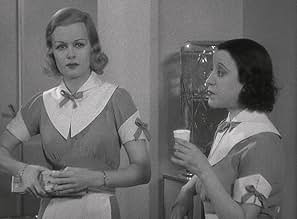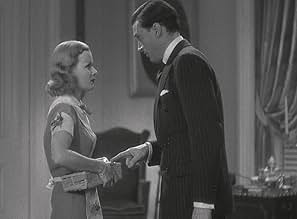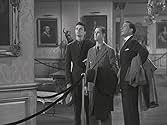La sfacciata manicure Eve Fallon viene reclutata come giornalista ancora più sfacciata e aiuta il fidanzato detective della polizia Danny Barr a smantellare un'organizzazione di furti di gio... Leggi tuttoLa sfacciata manicure Eve Fallon viene reclutata come giornalista ancora più sfacciata e aiuta il fidanzato detective della polizia Danny Barr a smantellare un'organizzazione di furti di gioielli e a risolvere l'omicidio di un neonato.La sfacciata manicure Eve Fallon viene reclutata come giornalista ancora più sfacciata e aiuta il fidanzato detective della polizia Danny Barr a smantellare un'organizzazione di furti di gioielli e a risolvere l'omicidio di un neonato.
- Regia
- Sceneggiatura
- Star
- Premi
- 2 vittorie totali
- Don Butler
- (as Henry Kleinbach)
- Elevator Operator
- (non citato nei titoli originali)
- Customer
- (non citato nei titoli originali)
- Manicurist
- (non citato nei titoli originali)
- Customer
- (non citato nei titoli originali)
- Man Exiting Elevator
- (non citato nei titoli originali)
Recensioni in evidenza
Well, the big brown eyes that come to mind here belong to Cary Grant, who is coming into his own here. You'll recognize not only the looks (the eyes are heavier in the earlier films) but a mature attitude, the relaxed and cocky and sarcastic fellow that is so famous.
The leading woman is Joan Bennett, who plays Grant's love interest. Bennett is not well known as a type the way Crawford or other women from her period are, and it's partly because she plays a kind of generic character, in this case a blond, sweet, smart, fun woman. She actually became more famous later in a couple Fritz Lang dramas (as a brunette), also playing a type. what she had going for her was a natural and fluid ease before the camera. And an ability to fit a part, not steal the show.
Because the show belongs to Grant. And Grant here is a cop, Danny Barr. He tends to insert his casual confidence and slow ease as a cop and it's actually a pretty interesting fit, not at all the stereotype created by harder boiled types, or more witty ones (name a half a dozen famous ones). It's fascinating to watch him at this pivotal point in his career. It's usually pointed out that Grant's persona solidified in 1937 in "The Awful Truth" but having watched most of these films from this period it really seems that he's fully himself here, a year earlier. History is right in the sense that "The Awful Truth" pushed Grant's career up a notch simply because it's a better movie. And he has a more prominent role in it.
Here, the action is spread between Grant and his cops, Bennett and her life bouncing from being a manicurist to a reporter, and the "bad guys" who are up to their usual no good. These thugs are actually pretty convincing, falling short of the hardened awful types of some movies. One of them (the kingpin) is a young Walter Pidgeon, who is not quite right in his role, but it's fun to see him so early in his career.
"Big Brown Eyes" is poorly name, but besides that it's not a bad movie at all, and if you follow the several plot lines (all connected) it gets pretty interesting. Every now and then when the plot is sped up (thankfully) the camera shows a whole range of characters close up and at a tilt. It's both affected (a little at odds with the rest of the movie) and successful (at speeding up the plot with appropriate humor and agitation). There are some fun twists (like when Bennett accidentally makes a fingerprint dusting using some talcum powder. And there are lots of turns, people quitting jobs and leaving town, and some odd shocks, as when the baby is killed.
In the end it's also a romance with Grant in the lead role, well done and sharply acted. See it.
*** (out of 4)
Detective Danny Barr (Cary Grant) is trying to track down some jewel thieves but one day he is given the grim news that a baby has been shot and killed in a park. He finds that the two crimes are connected but can't get any real clues until his girlfriend Eve (Joan Bennett) goes to work for a newspaper.
Yes, you heard the plot of BIG BROWN EYES correct. It's a movie that features a baby being shot and killed. That was a rather dark subject for any period of films but you have to wonder how that plot point got past the Hayes Office just a year after they were coming down on certain topics. Apparently a film with a baby being shot was okay as long as the male and female stars weren't kissing for over five seconds.
As far as the film goes, director and co-writer Raoul Walsh does a very good job at mixing several genres together and in the end they all work quite well. You've got the mystery of the jewel thieves and the baby murder. You've got the back and forth romance between Grant and Bennett. You've also got some comedy thrown in for good measure, although the killing of the baby is a tad bit dark for the rest of the picture. All of these elements work very well and it plays out quite nicely.
Grant was yet a major star but you can see the comic timing really starting to come out here. I've been going through his films in the order that he made them and this role was clearly one of the best of his early career. He got to play the tough cop and do it nicely but his comic and romantic timing is that classic Grant. Bennett is also very good in her supporting role and makes for some good charm and there's no question that the two leads have some nice chemistry. Walter Pidgeon, Lloyd Nolan and Joe Sawyer are also good in their supporting bits.
BIG BROWN EYES isn't all that well known, which is a tad bit shocking considering the cast, the director and the fact that it's a good movie. The film even has some fun with Grant having him play a ventriloquist. There's even more fun to be had when Bennett says a classic Mae West line to him.
Grant is a police detective and Bennett a manicurist turned reporter (only in Hollywood) who team up in life and who team up to solve a series of robberies. What begins as high end jewel robberies turns deadly serious when during a payoff gone bad, a baby is killed in the park by a stray bullet.
When the doer Lloyd Nolan is acquitted in court due to perjured testimony and political influence, Grant quits the force and Bennett goes back to manicuring and look for justice in an unofficial manner. Need I say they get it though you have to see Big Brown Eyes to find out how its done. But I will say that forensics and Bennett's manicurist training does help a lot.
Walter Pidgeon is also in the cast as a crooked politician, hip deep in the rackets, a type that Thomas E. Dewey was putting in jail with increasing frequency in New York at the time. Two very funny supporting performances come from Marjorie Gateson as an amorous robbery victim with an eye for Cary Grant and Douglas Fowley who was one of the gang that they trick into squealing. That is the highlight of the movie.
Big Brown Eyes is a slick comedy directed by Raoul Walsh who gets the whole cast in sync like a Swiss watch. An unusual film for Cary Grant, but his fans will like it.
Walter Pidgeon plays Cortig, the head of the jewel theft ring which is also involved in the murder of a child who was hit by one of Cortig's stray bullets. He's joined by Lloyd Nolan. Thanks to his crooked attorney, Cortig is found not guilty. Dan is so upset he quits the force to go out on his own and get justice. Eve returns to her manicure job; both are very defeated by the trial.
This is an okay, fast-moving film with Bennett playing what today would be considered a stereotype, you know, the gum-cracking, wisecracking blond. Grant is very handsome and slips easily into his role. He's not the "Cary Grant" persona quite yet. That's a couple of years away.
I don't know who the Big Brown Eyes were, but it must have been Cary Grant. I saw Joan Bennett in person near the end of her life - she was very tiny, with very black hair, and had beautiful blue eyes.
Lo sapevi?
- QuizAt 20 minutes, Eve Fallon (Joan Bennett) says to Danny Barr (Cary Grant), with a flirtatious wink, "if you happen to be around my way, come up and see me some time". This appears to refer to a famous, almost identical line said by Mae West to Cary Grant in "She Done Him Wrong" (1933), a playful in-joke that would have been obvious to contemporary audiences.
- Citazioni
Richard Morey: Cortig, if you bought a gift for a girl and she refused to accept it, what would you do?
Russ Cortig: [with a slow smile] I'd give it to my wife.
- ConnessioniFeatured in The True Adventures of Raoul Walsh (2014)
I più visti
- How long is Big Brown Eyes?Powered by Alexa
Dettagli
- Tempo di esecuzione1 ora 17 minuti
- Colore
- Proporzioni
- 1.37 : 1
Contribuisci a questa pagina


































